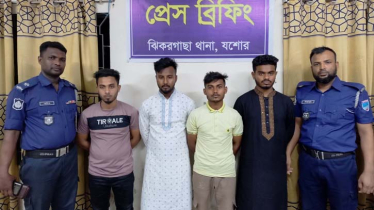
Photo: TDM
Monir Uddin Ahmed, a courageous soldier who played a vital role in the liberation war, left an indelible mark on the memory of the nation.
Monir Uddin Ahmed was born in 1951 in Atiyatali village, Lakshmipur Sadar Upazila, Laharkandi Union; his determination to fight for freedom was ignited when Pakistani forces executed Operation Charge Light at Pal House in Majupur, resulting in the loss of 8 to 10 innocent lives. This tragic incident fueled the resolve of the people, propelling them towards the path of war.
Recalling the beginnings of their journey, Ahmed shared, "One morning, along with Ansar Uddin, Nasir Uddin, Bashir Master, Humayun Kabir, Bangakhar Abdul Halim Basu, Oli Ur Rahman (Mandari), Masudur Rahman, Mofiz Ullah, and Fazlul Karim Chowdhury (Bamani), we embarked on a mission to India for training. We bid farewell to our homes and departed from Jakshin by bus. Along the way, we were joined by Abu Taher, Anwarul Haque Master, Montu, and others at Bangla Bazaar. After alighting at Kalkani Haat, we entered the Indian state of Tripuraalong with Ansar Uddin, Nasir Uddin, Bashir Master, Humayun Kabir, Bangakhar Abdul Halim Basu, Oli Ur Rahman (Mandari), Masudur Rahman, Mofiz Ullah, and Fazlul Karim Chowdhury (Bamani), we embarked on a mission to India for training." We bid farewell to our homes and departed from Jakshin by bus. Along the way, we were joined by Abu Taher, Anwarul Haque Master, Montu, and others at Bangla Bazaar. After alighting at Kalkani Haat, we entered the Indian state of Tripura. From there, we proceeded to the Palatona training camp after spending some time at the Chottakhola and Rajnagar reception centres. We joined a group of 25 individuals from the Poddar Bazar area, totaling two hundred trainees. Our training commenced at the Palatona Camp."
After 45 days of intensive training, each member was equipped with rifles, stenguns, S. L. R. National Weapons, grenades, and deadly bullets. Guided by individuals who knew the border crossing routes, they embarked on a treacherous journey. Crossing the Chouddagram border, they traversed the rugged terrain of Bangladesh, reaching the banks of the Gunvati River at dawn. With an enemy camp situated a short distance away, they braved exhaustion and peril, crossing the river and finally reaching Kalkini Hut. Rest and nourishment were arranged in a house adjacent to the market. As evening fell, the freedom fighters dispersed to their respective areas. Ahmed's path led him to Sompara, where he was welcomed by Mahabub. From there, wartime commander Rafiqul Haider brought them to Poddar Bazaar, where they reunited with comrades such as Zainal, Hamde Rabbi, Masudur Rahman, Rafiqul Islam, Shahalam Chowdhury, Shamsul Islam, Nurul Amin, Zahid Hossain, Fakrul Islam, and Razzakul Haider.
Within the jurisdiction of Lakshmipur police station, AAM Safiq Ullah served as the commander of the Bangladesh National Front (BNF). Rafiqul Haider Chowdhury played a pivotal role as the chief organiser of the local camp and the war effort. The Patwari house served as a sanctuary for freedom fighters who engaged in battles across various locations, including Ramganj, Poddar Bazar, Shyamganj, and Kalibazar.
Recalling the intense clashes between the freedom fighters and the Pakistani forces, Monir Uddin Ahmed reminisced about their strategies and audacious missions. The early morning physical training sessions at the Pilot School became an opportune time for a meticulously planned attack. Led by Commander Abdul Matin, they embarked on a perilous journey, navigating the waterways from Shyamganj to Raipur. Their objective was clear: strike the enemy when they least expected it.
However, fate dealt a tragic blow as Abdul Halim Basu, a comrade-in-arms, fell victim to the gunfire of the Razakars—collaborators with the Pakistani forces. Swift retaliation followed, with Shahalam, one of the Razakars, meeting his demise. The fallen hero, Basu, was brought back to the camp with great sorrow, his final resting place becoming a symbol of his sacrifice—Basu Bazar.
The freedom fighters pressed on relentlessly, launching regular attacks on the enemy's camps. With each encounter, they dealt heavy blows to the Razakars and Pakistani soldiers, forcing many to flee in fear. Finally, on December 4, Lakshmipur celebrated its liberation after a fierce assault on the Bagbari sub-house, dislodging the enemy forces.
However, even in the glow of independence, Monir Uddin Ahmed expressed his disappointment. He lamented the fact that some individuals, who had no part in the liberation struggle, were now being hailed as freedom fighters, while true heroes like Nashir Uddin, who underwent BLL training in India, remained unrecognised.
Today, Monir Uddin Ahmed, having married Nasima Begum in 1978, has embraced a successful career as a contractor. But the memories of those harrowing days remain etched in his heart, forever honouring the sacrifices made by him and his comrades.
TDM/SD








